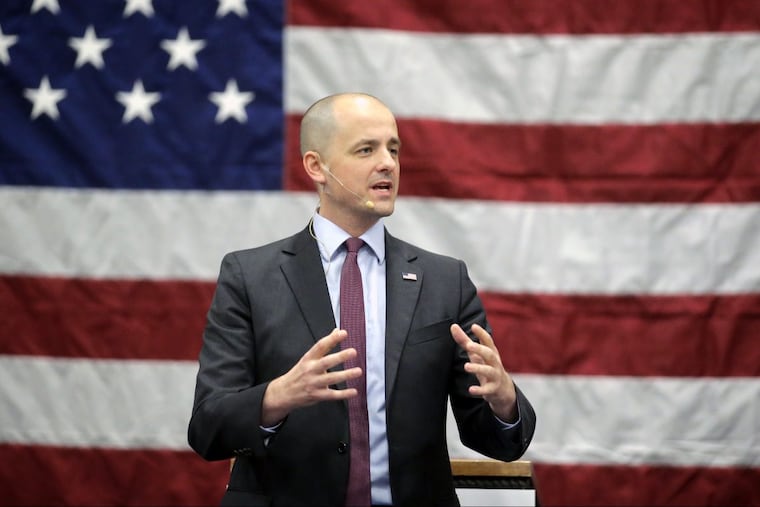Independents' movement hits Philly, walking in Founders' footsteps
The Centrist Project, founded by a Dartmouth professor in 2013, seeks to build independent representation from the state legislative level to governor's mansions and the U.S. Senate.

Almost 250 years after a group of patriots convened the Continental Congress in Philadelphia, another group of loyalists is coming here for a retreat this weekend with similar intentions. Only it's not King George III that these iconoclasts seek to free us from, but rather the bonds of a duopoly never envisioned by the likes of Washington, Adams, and Jay.
"The Founding Fathers, especially George Washington in his farewell address, warned us against the partisanship that has developed, and there's not a single mention of political party or Democrat or Republican in the Constitution or the Declaration of Independence," explained Matthew Dowd, a volunteer adviser for the Centrist Project, who is the chief political analyst for ABC News. "So where we are today is not what the Founders envisioned, and I'm hoping independents can help get us back to the principles we were based on as a country,"
The Centrist Project is a nonprofit founded in 2013 by Dartmouth professor Charles Wheelan. It seeks to build independent representation from the state legislative level to governor's mansions and the U.S. Senate. The group's "Fulcrum Strategy" seeks to win enough Senate seats to deny both major parties a majority and thereby lessen their leverage.
The independent movement would seem to be a cause in search of some leadership. According to a Gallup survey undertaken in July, 45 percent of Americans regard themselves as independents, compared with 28 percent who say they identify as Democrats and 25 percent who regard themselves as Republicans. Still, there are only two independents in the U.S. Senate (Bernie Sanders and Angus King) and none in the U.S. House. Several of those in Philadelphia this weekend seek to change that.
Among those gathered are Alaska Gov. Bill Walker, who is expected to run for reelection as an independent; potential gubernatorial candidate Greg Orman, who obtained 43 percent of the vote in Kansas in 2014 running as an independent against Republican incumbent Sen. Pat Roberts; Terry Hayes, the Maine state treasurer and a declared independent candidate for governor; and Evan McMullin, the former CIA operations manager who, despite waiting until August 2016 to run for president, garnered more than 21 percent of the vote in November in Utah and is mulling a Senate run. (Joel Searby ran McMullin's campaign and is now the senior adviser for the Centrist Project.)
"Without a doubt, we are realizing one of our Founders' greatest fears with the division of our republic into two political factions that ultimately undermine the public interest," said Nick Troiano, executive director of the Centrist Project. "We are meeting in Philadelphia to draw inspiration from our history and plot a new way forward for the future of our politics."
Jason Grenn is an example of that new way forward. He won an Alaska state assembly race last year as an independent and joined forces with one other independent, three moderate Republicans, and the Democratic caucus to flip control of the 40-member chamber from the GOP to a new bipartisan governing majority –– ensuring that whatever passes in the statehouse does not pass along strict party lines.
Troiano said speakers for the weekend gathering are coming from around the country, even around the world, to brief the group on topics of policy, campaigns, and reforms, including a key architect of the "En Marche!" movement in France. He said more than 10,000 Americans have pledged their support to a national slate of independent candidates and small donors have already begun crowdfunding a super PAC to support them.
Dowd told me the challenge is to find a way to relieve voters of the status quo, which he calls a "duopoly," that forces voters to pick only from one party or the other. That will require both practical and emotional change.
"I think there are legal barriers in getting on the ballot and all those sorts of things, but it's not as much as the psychological barrier that people have," Dowd said. "They feel like they have to pick between one or the other because that's who's going to win, and it's by and large, up until now, who has won. But I think we're set in a moment where the fastest-growing group of voters are independents, and more and more people are disgusted by the two major political parties. We're in a great time of disruption where technology has allowed people to communicate effectively and efficiently at a low cost.
"People are now open to the consideration of voting for somebody other than the Republican Party or the Democratic Party," he added. "But I think the system has been in place now, and you add media and then social media, it's pushed … the Republican Party further right and the Democratic Party further left and it's left a wide-open gap in the middle for somebody to appeal to."
The retreat is not open to the public, but those interested in learning more can visit pledge.centristproject.org.
Michael Smerconish can be heard from 9 a.m. to noon on SiriusXM's POTUS Channel 124. He hosts "Smerconish" at 9 a.m. Saturdays on CNN. @smerconish